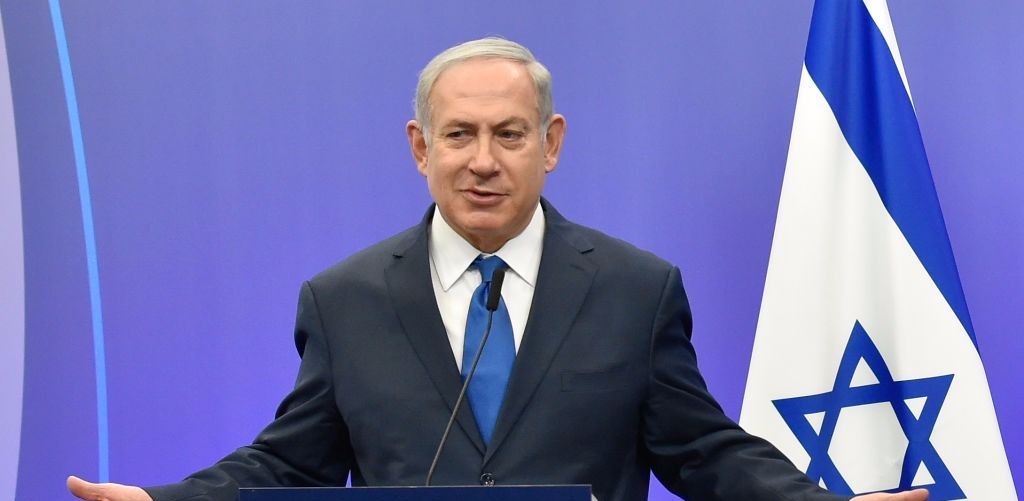Netanyahu sends Iran a warning
February 19, 2018 | Expert Insights

At the Security Conference in Munich, Israeli Prime Minister Netanyahu issued a warning to attending Iranian Foreign Minister Zarif “Do not test Israel’s resolve”. At the conference, Netanyahu stated that Israel would not back down from military conflict with Iran, whether proxy or direct.
This warning is characteristic of the aggressive stance taken by Israel on Iran in recent months. Less than two weeks ago, an Israeli jet was shot down from Iran backed positions in Syria.
Background
Relations between Iran and Israel have been hostile since the 1990s. Ties deteriorated after Ayatollah Khomeini came into power during the Iranian revolution in 1979. Khomeini didn’t like the friendly equation between the two nations, and declared that Israel was an enemy to Islam.
Israel and Iran began fighting in proxy wars against one another during the tenure of Mahmud Ahmedinijiad, the President of Iran from 2005 to 2013. In 2006, reports emerged that Iran had provided aid to Hezbollah fighters (considered a terrorist organisation by Israel) during the Lebanon war. Israel is said to have carried out three specific airstrikes targeting Iranians during the Gaza conflict. The two nations have blamed each other for terrorist attacks, assassination, cyberattacks and more.
The Iranian nuclear accord was signed by several members of the international community in 2015. According to this accord, Iran would limit its nuclear ambitions in return for the removal of a number of economic sanctions. Israel views the current regime in Iran as a threat regardless of nuclear capacities.
Benjamin Netanyahu, the Prime Minister of Israel has accused Iran of trying to turn Syria into “one large missile factory”, with the aim of attacking Israel. Earlier this month, Israel carried out air strikes in Syria, and days later, an Israeli jet was shot down while returning from a raid on Iran-backed positions in Syria, leading to concerns that Syria would become the site for yet another proxy conflict.
Prime Minister Netanyahu is currently embroiled in a scandal for alleged bribery, fraud, and a misuse of public funds. Several other members of Netanyahu’s inner circle are also under investigation, including a number of associates and former chiefs of staff.
Analysis
Iran was the main subject of Benjamin Netanyahu’s talks at the Security Conference in Munich this weekend. The Israeli Prime Minister reasserted his position on the Iran nuclear deal, as well as Iran’s position on Syria.
On Sunday, Israel stood by its position to scrap Iran’s nuclear agreement, a position shared by the US President Donald Trump. “I think they’ll do nothing”, said Netanyahu, in regards to possible retaliation to changing or scrapping the deal. Netanyahu went on to compare the deal to the Munich agreement drawn by the Allies to pacify Hitler prior to World War II. He claimed that with this agreement, Iran would be a nuclear power within a decade.
Mohammad Javad Zarif, the Iranian Foreign Minister said in response to these statements: “I can assure that if Iran’s interests are not secured, Iran will respond, will respond seriously. And I believe it would be a response that means people would be sorry for taking the erroneous action they did.”
Meanwhile, Saudi Arabia expressed its belief that Iran would require more restrictions and inspections. Former U.S. Secretary of State John Kerry dismissed Netanyahu’s claims of the possibility of a nuclear Iran.
Netanyahu also brought up Iran’s role in Syria, warning Syrian President Assad against inviting Iranian military into his borders. “Israel will continue to prevent Iran from establishing a permanent military presence in Syria,” he said. “…To prevent Iran from establishing another terror base from which to threaten Israel.” He added that Israel would be willing to take direct action, not merely against proxy militant groups, but against Iran itself.
“Do not test Israel’s resolve,” Netanyahu said, addressing the Iranian Foreign Minister, while showing the crowd a piece of what he claimed was an Iranian drone shot down by Israeli forces.
Zarif denied that the drone was Iranian, and derided what he called an attempt “to create these cartoonish images to blame others for its own strategic blunders, or maybe to evade the domestic crisis they’re facing.” Zarif called for a “new security approach in the Gulf.” "We want a strong region, we do not want to be the hegemon in the region as we believe the era of hegemony is long past - regionally as well as globally," he said.
Assessment
Our assessment is that there is continued hostility between Israel and Iran as both parties vie for greater influence in the Middle East. Recent clashes in Syria and Israel’s strong warnings indicate the two nations may be on the brink of a larger conflict. As mentioned in the previous article, we also believe that Netanyahu’s remarks are an extension of his populist rhetoric, possibly adopted to distract from scandals at home.








Comments